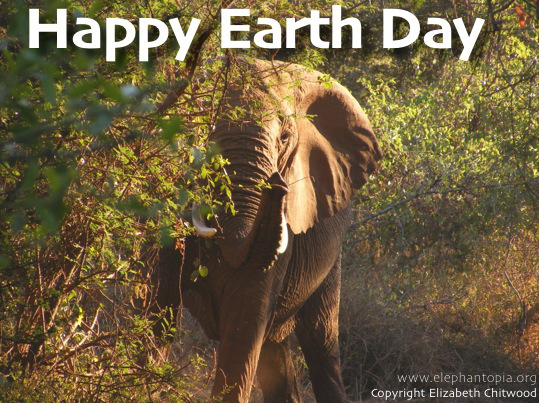 Happy Earth Day, Happy Earth Week. This is a chance to think about the world we live in and see where we all fit in. An opportunity for reflection and action. Take a moment today, or sometime this week, to go sit outside. Close your eyes and just listen. What do you hear? Birds? Wind in the trees? Traffic? People? Now open your eyes. What do you see? A lizard? Plants? Concrete sidewalks? Buildings? No matter if it’s man-made or natural, there is one thing that unites us all: the earth.
Happy Earth Day, Happy Earth Week. This is a chance to think about the world we live in and see where we all fit in. An opportunity for reflection and action. Take a moment today, or sometime this week, to go sit outside. Close your eyes and just listen. What do you hear? Birds? Wind in the trees? Traffic? People? Now open your eyes. What do you see? A lizard? Plants? Concrete sidewalks? Buildings? No matter if it’s man-made or natural, there is one thing that unites us all: the earth.
Indeed as Wendell Berry put it, “the earth is what we all have in common.”
Regardless of your political & religious views, your economic standing or the color of your hair, skin and eyes, humanity, animals, plants and water all share the earth. And what we do with our time and resources does make a difference.
For instance, when elephants walk through high grass, they provide food for the birds by disrupting insects, bugs and reptiles in their path. Or when elephants dig water holes in dry riverbeds using their tusks, the depressions created by their footprints trap rainfall providing water for other species. Or when elephants eat, they act as seed dispensers through their fecal matter. Often, dung beetles and termites carry their feces below ground, causing the soil to become more aerated and further distributing the nutrients. And these are just a few examples of how the actions of elephants impacts the environment and species around them, in a positive manner.
This challenged me to examine what I do and how it affects the world around me. First off, how do I use what I have to improve the lives of others around me? How often do I walk to the store (it’s a block away from where I live) vs. driving? When I am using my water, am I being wasteful or am I conserving so that there is more to be used by others? Do I buy only the amount of food I need, or do I buy excess and end up wasting food that I could have shared with others?
Secondly, how do I use my resources to make positive impacts on the wildlife around me? Do I feed the birds my old breadcrumbs? Do I plant my own herbs and small vegetables? Do I use cleaners that are good for the environment? Do I create places of sanctuary for birds, bees, insects, etc? Do I pick up trash I see in my neighborhood?
I want the actions of my life to leave a positive trail behind me. Elephants are a keystone species to their surroundings. Other plants and animals depend on the elephant for survival. Humans are no different. We too are keystone species and many plants and animals, especially in our concrete jungles, depend on us to help them survive.
This week is earth week. It’s a great time to reflect. But let’s make sure that it doesn’t just end in thinking. As Walt Disney said, “the way to get started is to quit talking and begin doing.”
Looking for some practical ways to help the world’s largest land mammal? Here are few things I am doing that you might find helpful as well.
1. Foster an orphaned elephant. I sponsor Naipoki through the David Sheldrick Wildlife Foundation
2. Volunteer at your local zoo (be sure to check if it’s an accredited AZA one) or animal shelter
3. Sign petitions and write letters to local and international governments letting them know how important elephants are and how we must stop the ivory trade (begin by signing Elephantopia’s petition today - then visit iWorry and KillTheTrade to find more ways for your voice to be heard).
4. Share facts about elephants with your family and friends. It’s surprising how many people do not know about the impending extinction of these great creatures (every M/W/F Elephantopia posts elephant facts on Facebook. Easy way to share with your family and friends too!)
5. Subscribe to this blog, LIKE it on Facebook & FOLLOW on twitter to keep up with the latest information on elephants around the world.

Why volunteer at a zoo? They have too small of space for elephants, many in inappropriate climates, and worse they advocate breeding under the lie of “conservation” when it is really to make more money-making babies
Attention please for why you recommend volunteering at a zoo? Zoo’s are not capable of supplying the necessary accommodation elephants need to thrive such as land and the company of a full fledged herd.
Thank you for sharing your concerns about zoos. Although not ideal in a perfect world, zoos provide a place for education and awareness about animals, especially endangered animals, with the wider public. They also play a key role in species survival programs and provide research. However, the only zoos that one should consider volunteering at would be listed with AZA since they have strict requirements for care and enrichment for the animals. You may be interested in a previous post about zoos: http://elephantopia.org/2013/04/11/qa-3/
Save Queenie and Deborah Kingston, National Geographic NewsWatch published this article today that addresses many of your concerns as well. You might be interested to read: http://newswatch.nationalgeographic.com/2013/04/23/captive-elephant-management-interview-with-knoxville-zoos-curator-of-elephants/